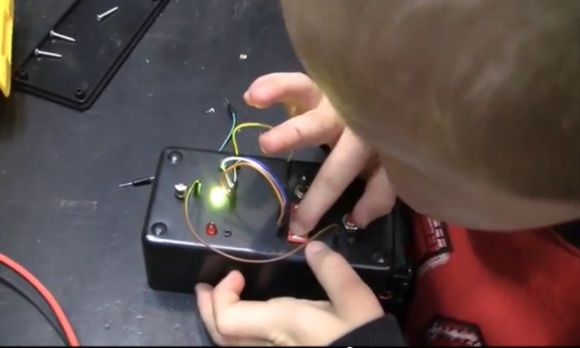
Here’s a great idea: an Educational Circuit Box you can make to get kids interested in electronics! What looks like a boring project box with wires sticking out might just become a box of wonder and curiosity for young ones.
[Fileark] built this for his son, and has happily shared it on his blog for others to recreate. As you can probably guess from the picture, it makes use of a project box, LEDs, buttons, switches, and female header pins. Using the included breadboard jumpers picked up off of eBay, it allows your kid to learn about circuits by plugging in different components and seeing what happens.
The majority of the parts he used were salvaged from scrap electronics he had laying about. It’s a great way to turn e-waste into something fun and educational for kids! For more information about the project, stick around after the break to see [Fileark] explain (and his son demonstrate!) it in a video.
Fun fact—the YouTube URL of the video ends in “aww”!
















When I was veryvery little, probably 4 or 5, my grandad made me my “burglar alarm” as a birthday present. Best present I ever got! It was some pegboard (the pressed board with lots of holes in it), with sockets in some of the holes. There were batteries, an electric bell, and I think some lightbulbs and switches. I’ve no idea how he made it now, but it came with some wires with compatible plugs on the end, and by plugging them into the holes I could make all sorts of things!
I didn’t really understand it at the time, but you couldn’t take it out of my hands! A tip might’ve been to use a slightly quieter bell! Just the sheer pleasure of plugging wires in and setting bells and lights off and thinking I was a scientist! Certainly made me the chap I am today!
So brilliant idea! Even if the kid doesn’t necessarily understand a lot, being able to plug wires into things, to make stuff happen, and more importantly, *to feel like he’s made something himself*, will thrill any would-be micro-geek to little cute tiny bits!
I think the working principles, and probably everything else, are less important than the feeling of the kid having made something for himself, even through trial and error, or random luck. So it should be simple, foolproof, and come up with rewarding results, ideally different ones to discover. I’d worry a bit about jumpers getting eaten, or stuck up noses. Plugging wires in seems “clever”, and is easy and safe enough.
Anyway… lucky boy!
Ah wait, jumper WIRES, not jumpers! Very different and less swallowable. Just looking now, seems a really interesting thingy, and similar to my old one in some ways.
Very well done! I love projects that encourage the next generation of will-be hackers. When I was younger, I had one of those “101 projects” radio shack kits and I loved it. Tried looking for the book recently, but to no avail.
I’ve got a friend whose son is intrigued by electricity, so for his birthday I might try to make one for him. Again, very nicely done!
Te concept is really good. I worked with small children a few years ago, and designed something similar, based on the “black box” concept: A box with an interuptor and two wires with aligator clips coming outside, same with battery, leds, buzzer, etc. Circuits sometimes tended to be messy, but was really very easy for assembling & dissasembling for very small kids without yet very good manipulation skills, they really don’t have to know about electrons or ohms law to learn and have fun, that’s the concept behind LOGO and MINDSTORMS!
Reading this I really wonder when I should start to introduce my future kids to electronics. I’m concerned about his/her curriousity to experiment with dangerous voltage when I’m not around.
Hm, dunno, if he / she sees you playing with your electronic stuff, but never ever plugging any of your projects into the mains, he (I’ve decided you’re having a boy for ease of typing) might copy you in respecting and fearing mains voltage. Tell him that even you don’t touch it because that’s the dangerous kind of electricity, not the nice fun kind in batteries. Different thing altogether.
Since you won’t be teaching him proper electronics, it doesn’t matter. Just having fun plugging stuff together, and feeling like he’s made something work, should be a good start for a wee ‘un. He can learn about mains power when he’s older. By the time Ohm’s law means anything to him, he’ll be past the sticking fingers in things stage.
http://makezine.com/2007/09/24/complete-bloctronic-manua/
This was the kit I had when I was a kid. I don’t think it exists any more.
Very cool toy, I don’t remember these. I will be looking for a set.
What was old is new again:
http://www.kickstarter.com/projects/lightup/lightup-learn-by-making
I thought there was a KS project that used blocks/magnets but couldn’t find it again.
these guys started out as a kickstarter http://littlebits.cc/kits/premium-kit